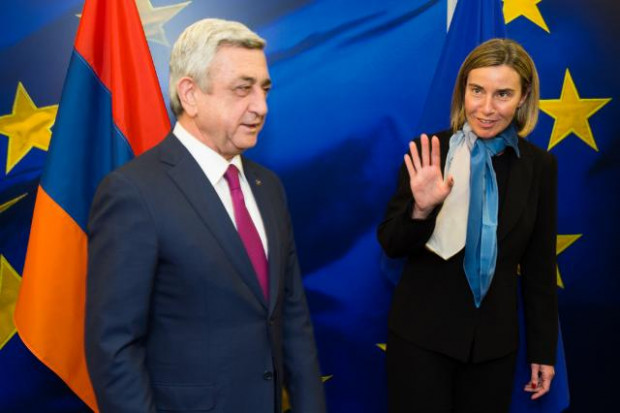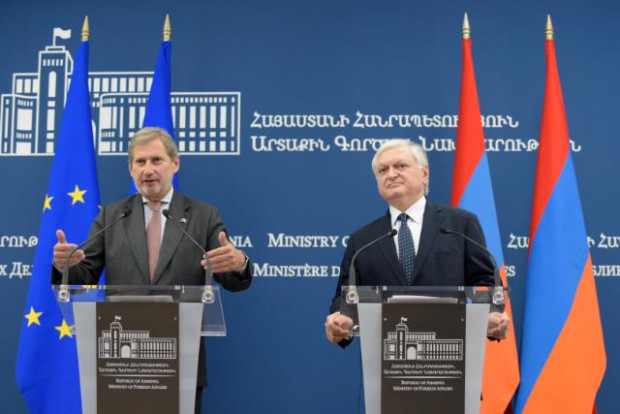YEREVAN. – The next Eastern Partnership summit will kick off in Brussels on November 24 . For once, it will be of special importance for Armenia as the sides are expected to sign a Comprehensive and Enhanced Partnership Agreement.
How it all started
The Eastern Partnership, presented by the Foreign Ministers of Sweden and Poland in 2008, aims at building a common area of democracy, prosperity, stability and cooperation between the EU and six countries: Armenia, Azerbaijan, Belarus, Georgia, Moldova and Ukraine.
The EU invited some countries, among them Armenia, to conclude an Association Agreement, which was to be initialed, and ratified by the parties. Armenia and the EU entered into negotiations on the Association Agreement, including the establishment of a deep and comprehensive free trade area back in July 2010.
Armenia announced its accession to the Customs Union in September 2013 and refused to conclude an agreement with the EU. Despite the refusal, EU decided to develop further relations with Yerevan. On 12 October 2015 the Foreign Affairs Council authorized the European Commission and the High Representative to open negotiations on a new, legally binding and overarching agreement with Armenia, and adopted the corresponding negotiating mandate. Negotiations on the Comprehensive and Enhanced Partnership Agreement were successfully concluded on 26 February 2017.

Second attempt
Armenia's rapid decision not to sign the agreement in 2013 gave rise to mixed reactions. On the one hand, the EU was surprised, even shocked by such a decision. On the other hand, the developments in Ukraine made it clear that it was to be expected.
“The rapid change in political and economic preferences in Yerevan served like a cold shower for the EU bureaucrats. Stefan Fule, who served as the European Commissioner for Enlargement and European Neighbourhood at that time, could not hide his dismay when he said that the Association Treaty ‘is no longer on the table because of Armenia’s decision to join the EEU’. However, Fule reiterated the EU’s support in continuing dialogue with the civil society in Armenia. For some, the decision, taken by Sargsyan in the run-up to the 2013 EPS in Vilnius, was at first sight unexpected, but it barely surprised those who are familiar with the economic situation of this small South-Caucasian republic,” analyst Violetta Rusheva wrote.
.jpg)
In the wake of the upcoming summit, many experts focus on the fact that it is important for Armenia's second attempt to sign a new cooperation agreement with the European Union. Even so, it is hard to say that all this time, EU-Armenian relations have not been developing since the previous summit. Despite the excitement over the future summit, experts note the new agreement will be mostly a continuation of something that already exists for years.
Visa regulations
Despite Armenia's refusal to sign the Association Agreement in 2013, the EU-Armenia Visa Facilitation and Readmission Agreements were signed, which entered into force in January 2014. As noted in the declaration adopted following the Eastern Partnership summit in 2015, the parties are looking forward to considering the possibility to open a visa-dialogue with Armenia, on condition that Armenia continues to ensure sustainable development on previously signed agreements.
These days the European Parliament adopted a document for the Brussels summit which recommended the EU Council to open a visa-dialogue with Armenia.

Karabakh conflict
“The unresolved Nagorno-Karabakh conflict remains an obstacle to increasing stability and prosperity in the region. Since 2003, an EU Special Representative has been working to facilitate dialogue between the European Union and the countries of the region and to assist the EU in developing a comprehensive policy towards these countries. The EU, including through its Special Representative for the South Caucasus and the crisis in Georgia, supports and complements the efforts of the Co-Chairs of the OSCE Minsk Group (France, the Russian Federation and the United States) to facilitate the resolution of the conflict,” this is the official position of Brussels on the Karabakh conflict.
The same recommendations approved by the European Parliament last week called for the parties to the conflict to end the confrontation. MEPs urge the EU Council “to call for an immediate end to military hostilities between Armenian and Azerbaijani forces which unnecessarily claim the lives of civilians and soldiers whilst hampering socioeconomic development and to reaffirm support to the OSCE Minsk Group co-Chairs’ efforts to solve the Nagorno-Karabakh conflict and to their 2009 Basic Principles, which include territorial integrity, self-determination and the non-use of force.”
EU assistance
The EU's financial cooperation with Armenia amounted to €118.5 million in grants for the period 2014-2017, with a primary focus on private sector development and reforms of the public administration and the judiciary. The Single Support Framework 2017-2020 will provide bilateral support for a total amount of around €160 million, focusing on areas such as economic development, innovation and personal development, improving the rule of law and the business environment, electoral assistance, and connectivity.
Trade with the EU accounts for around 23.6% of Armenia's total trade. The EU is Armenia's biggest export market with a 26.7% share in total Armenian exports. The total value of preferential imports from Armenia into the EU under the EU's Generalised Scheme of Preferences plus (GSP+) has increased from €42 million in 2014 to €108 million in 2016.
.jpg)
Furture of the Eastern Partnership
The Eastern Partnership Summit will take place despite many problems the EU is facing now. Some people doubt that the Eastern Partnership program has a future under existing problems, such as Brexit.
However, diplomats from the EU member states are more optimistic. According to them, the program was created to find solution to the problems in Europe jointly and in the light of mutual understanding with the EU neighbors, such as Armenia.
“The basic thinking behind both European Union and the Eastern Partnership is that so many of the challenges that we face in today’s globalized world are impossible to for us to address as individual countries. We need partnerships in order to learn from each other’s experiences and find joint solutions to those challenges. As for Sweden, we’ve become successful much thanks to our cooperation with our neighbours, both with our fellow EU member states and also with our others neighbours. I think a lot more can be done within the Eastern partnership to encourage partner countries to learn also from each other,” said Charge d’ Affaires of the Embassy of Sweden in Yerevan Mr. Martin Fredriksson.
Poland’s deputy foreign minister Bartosz Cichocki also noted that Eastern Partnership project has been faced with numerous challenges since its launch in 2009.
“Since its beginning in 2009, Eastern Partnership was a constant crisis management – we have had armed conflicts in Georgia and Ukraine and problems with territorial integrity of all EaP countries but Belarus. Nevertheless, we were able to introduce Association Agreements with Georgia, Moldova and Ukraine and to lift visa regimes for these countries. We are about to sign CEPA with Armenia, we have already started negotiation of an analogue agreement with Azerbaijan. Also Belarus signalizes its willingness to negotiate such a new agreement,” the diplomat said.






















